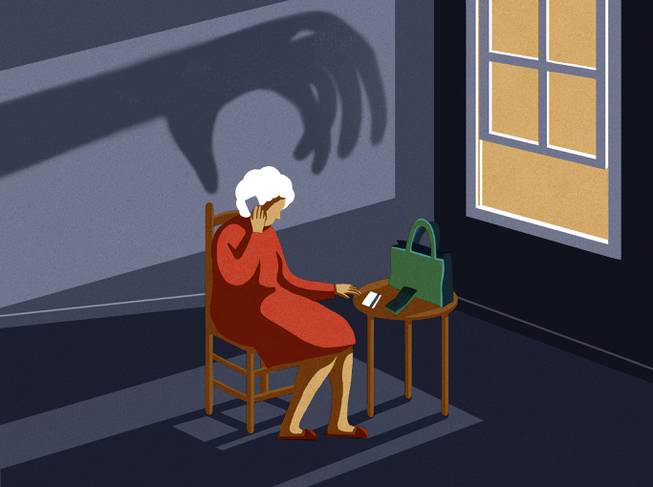
Boyoun Kim / The New York Times
Authorities are working to stop the spread of callers that try to get consumers — in particular, older people — to hand over money or private information.
Wednesday, March 3, 2021 | 2 a.m.
Seniors must stay vigilant as scammers try all angles to separate their targets from their money and sensitive information, a panel of experts said Tuesday.
Representatives from the FBI, U.S. Attorney’s Office and the AARP advised elders during a telephonic town hall to beware of scammers especially operating under the guise of government employees.
“These fraudsters, as you know, will go to great lengths to convince you that they are from the federal or local government with the sole intent of stealing your money and your identity,” said Maria Moore, AARP Nevada’s state director. “They pretend to be from the Social Security Administration, the IRS and more.”
Daniel Schiess, an assistant U.S. Attorney for the district of Nevada, and Las Vegas-based FBI agents Ray Johnson and Neal Umphress gave seniors the following tips:
• Agencies like the Internal Revenue Service will not contact via text message or email. They will send letters in the mail.
• Don’t click on links sent over email or text without being sure of them first. Try going to the agency’s main website, e.g., www.irs.gov, to verify any information purporting to come from government agencies.
• Never give out or confirm Social Security numbers or other identifying information, such as Medicare numbers, account numbers or log-in information, or birthdates, over the phone or through an unfamiliar website. Umphress said callers who already have this information may ask a person to verify it so they can illegally bill Medicare or Medicaid for services not rendered.
• Shred paper bills and other sensitive documents.
Johnson said many victims don’t report being swindled because they don’t know they’ve been hurt, they don’t know who to call, or they don’t want their family to think they can no longer look after themselves or their finances.
Schiess said people shouldn’t be afraid to just hang up if they suspect a scam caller.
“When you’re dealing with these imposters, it’s not being rude,” he said. “It’s being protective.”
“One of the reasons that you’re being targeted in the elderly community is you’re polite, you’re nice,” Johnson added. “Scammers use this to their advantage.”
A caller named Mary from Carson City said a caller claiming to be from Medicare tried to get her personal information to send her a new, plastic Medicare card.
“They said it was a precaution that the government was taking for my safety because plastic would be easier to sanitize from COVID,” she said. “But they wanted me to verify my Medicare member or my Social Security number, which I didn’t do.”
Umphress said Mary did the right thing, and this pitch was “news to me. I had not heard of that phone call, which makes me think it is a scam, clearly.” He said if Medicare wanted to send a new card, it would just do so directly through the mail.
The Federal Trade Commission’s Consumer Sentinel Network Data Book shows that Nevada ranked first last year in fraud reports, leading to $36.5 million in losses. Among those reports, imposter scams were the third-most common type.
The AARP maintains a fraud watch help line at 877-908-3360. Coronavirus-related scams can be reported to the Department of Justice’s National Center for Disaster Fraud hotline at 866-720-5721. Local police will also investigate fraud and often partner with federal agencies.
